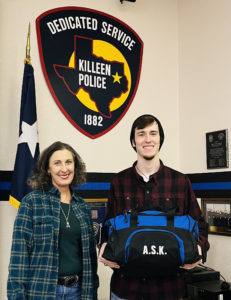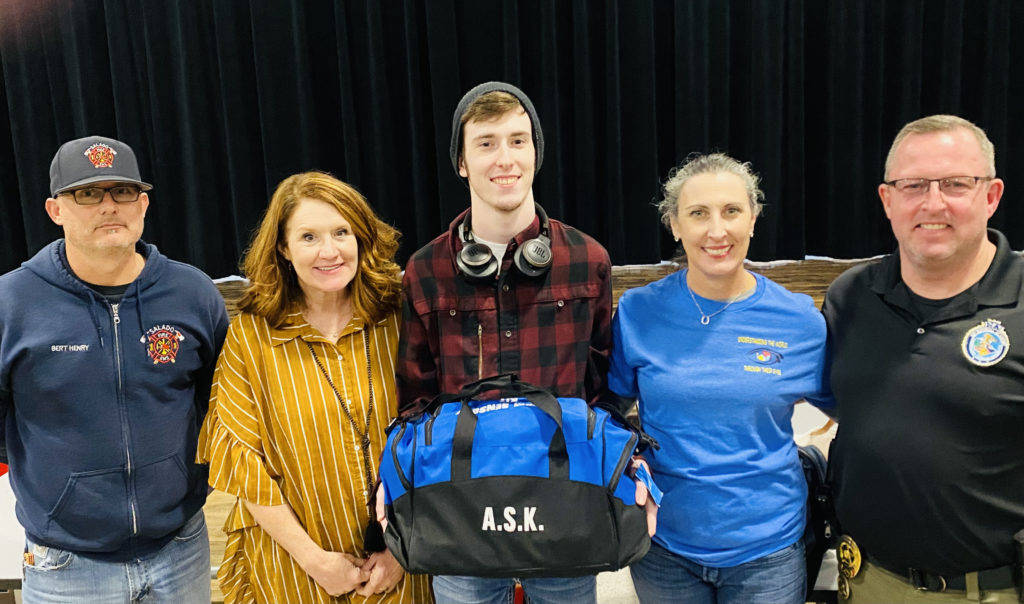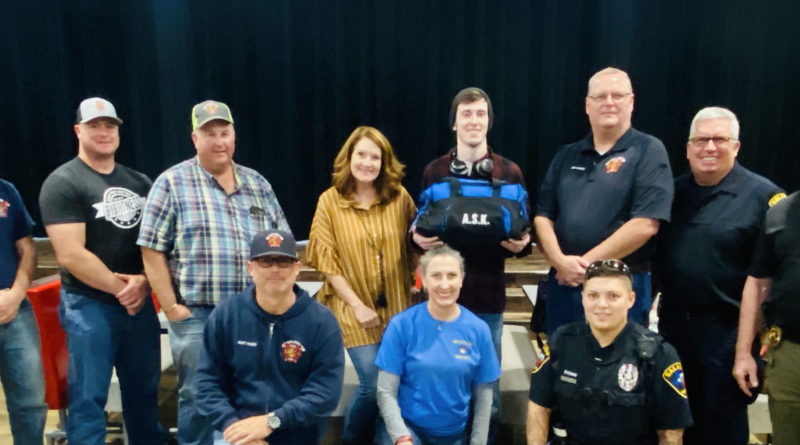Finding the Right BAIT
Bell County prosecutor Anne Jackson and her son help train police officers on how to better relate to people with autism
By Amy Rognlie | Photos courtesy of Anne Jackson

There are days when Bell County prosecutor Anne Jackson wonders which part of her life most defines her: parenting or prosecuting.
Each role requires applying rules to facts on a case-by-case basis and providing consequences that deter bad behavior and reward the good.
But over the last 20 years, autism spectrum disorder has impacted both of her roles and caused her to think about things from the perspective of a mind much different than her own.
Jackson’s oldest son, Tres, was born in Temple in 2000 when her husband, retired Air Force Lt. Col. Michael L. Jackson Jr., was first stationed at Fort Hood. The Jacksons began seeking a diagnosis for Tres when he failed to use words by the age of 2.
When he was 3, a developmental pediatrician ruled out autism. However, Tres’ struggles continued, and before he turned 11, he was diagnosed with Asperger’s syndrome, a form of autism. He was mainstreamed into general education classrooms and proudly graduated from Belton New Tech High School in 2018.
Anne Jackson’s parent and prosecutor roles collided in April 2015, when a juvenile probation officer reached out with a question, “How do I help children in the juvenile justice system who exhibit characteristics of autism?”
This colleague had several children on her caseload who appeared to be on the spectrum but had no autism-specific resources at her disposal to help these kids complete probation.
Later that month, a group of concerned juvenile probation officers, police officers, educators, licensed professional counselors, board certified behavioral analysts, attorneys, parents of children with autism and local nonprofit leaders began meeting to address gaps in the criminal justice system for autistic individuals. BAIT — the Bell County Autism Intervention Team — was born, and the group now meets monthly.
“One of the first things we discussed was that no one enters the criminal justice system without interaction with police officers,” Jackson said. “This began our quest to meet local police officers to see what they knew about autism.”
Soon, retired police officer John Jennings donated what he called “ASK bags” to BAIT. The autism sensory kits were full of sensory-friendly items like noise-canceling headphones, a ball cap, sunglasses, a large plush towel, a dry-erase board with markers, communication/picture-story cards, fidget spinners, Rubik’s cubes or “pop its” and a tablet/computer of some type. These items are helpful when first responders interact with individuals with autism because many of them have sensory and physical sensitivities. These sensitivities can be mild or severe and are often exacerbated when something unexpected happens that disrupts their routine.
As grateful as the BAIT team was for the ASK bags, members soon realized that a crucial component to distributing this helpful resource was training about what autism looks like and how to deescalate an autism crisis.
Enter Anne and Tres Jackson.
“When asked during July 2020 by the Bell County Sheriff’s Office to speak about autism, I began to look at Tres as ‘State’s Exhibit A’ in a jury trial to prove autism beyond a reasonable doubt,” Anne Jackson said. “I packed up Tres and hauled him to downtown Belton to share our story, . . . both of us never really quite knowing what the other would say.”
The class went so well that they taught it for the Bell County Sheriff’s Office several times, and as they say, the rest is history.
As of 2021, the Waco and Killeen Police Departments have implemented BAIT’s “Autism and Law Enforcement” class as part of their mandatory in-service training for every officer.
Since September 2021, Jackson and her son have co-taught 27 classes (each at least 2 ½ hours in length) to over 500 first responders.
Now 22, Tres Jackson readily identifies himself as an autistic person rather than “a person with autism,” feeling that the former term explains who he is more than how he thinks. It comes naturally for him to share the strengths and challenges of the autism community because he lives it every day. And now he has found a way to take his struggles and victories and turn them into a mission.

In the training classes, he likes to explain that he is the oldest of three sons, a military brat, a public high school graduate, a gamer, an employee, a recently licensed driver and an “autism ambassador.”
“For the officers, it is a powerful experience to hear two sides of our story — not only from a young man with autism, but also from a mama’s perspective,” Anne Jackson said. “We don’t tell them about autism. We show them autism.”
And the result?
“You can hear a pin drop at the end of the presentation,” she said, “and then this feeling of understanding and connection of having felt the heartbeat of someone in the flesh who has autism.”
The Jacksons and the rest of the BAIT team have embarked on an urgent mission and a far-reaching vision: to provide their training to every police officer in Texas.
“Our police officers absolutely have to have this,” Anne Jackson said. “The more Tres talks, the more the officers open up, attend and engage with Tres. Frequently the officers express anger that they did not have this training earlier in their careers. Then they express understanding and gratitude for having it now.”
Connect with BAIT
- Bell County Autism Intervention Team Facebook page: https://www.facebook.com/groups/1843391145891750
- Email: bellautisminterventionteam@gmail.com
“Three R” Mission Statement
With respect to autism, BAIT aspires to:
- Train first responders to RECOGNIZE the signs.
- Empower families to implement an appropriate RESPONSE.
- Equip communities with therapeutic autism specific RESOURCES.



